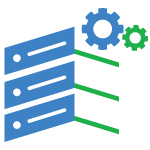
Why is Magento The Best for Ecommerce Sites? Magento 2.4.1 Hosting Recommendation. In this article, we will discuss why is Magento the best for e-commerce sites and who is Magento 2.4.1 hosting recommendation.
Why is Magento The Best for Ecommerce Sites?

One company’s experience with Magento is likely to be totally different than another’s because Magento is really what you make it. A team of highly skilled designers and web developers can make Magento into the Cadillac (or Maserati) of websites, but a poorly done ‘botched theme-job’ could leave you struggling with a site that looks like rubbish.
To get the most out of Magento you’ll want to engage with a company that is serious about SEO and Conversion Rate Optimization. To start you’ll want a site that has a place to update content regularly or that integrates with an outside blogging platform for regular content updates. You’ll want that blog to live at YourStore.com/blog and look very similar to the rest of your site however you do it, rather than blog.YourStore.com and looking like a totally different site. This ensures your blog content not only attracts potential customers but facilitates them around the site as seamlessly as possible without giving them a jarring effect.
“Everyone uses it”
Yes, we know that this argument may lead to false conclusions. It well may be that something is agreed on by the majority while it is not necessarily the best option.
But now we are talking about ecommerce and business results.
Magento is the second most popular ecommerce platform: it has a market share of 17%, among the Top 100k sites (Magento CE and Magento Enterprise combined, July 2017).
Professional technological support and huge knowledge base
The IT developers of Magento eCommerce, thanks to the help of volunteers, have been able to create a platform that truly serves the unique needs of users.
The flexibility and openness of the system is basically the result of this philosophy. A couple of years ago Magento was acquired by eBay.
This did not come as a disadvantage: it stayed to be an open source platform, while it also enjoyed the massive amount of expertise of the huge ecommerce company.
Magento Commerce then got independent of eBay, but its extremely strong and loyal developer community, which had evolved well before its acquisition by eBay, is still passionately working on its development.
Huge array of product information
It is no surprise that Magento is so popular: it is the most widely used ecommerce platform (according to 2015 statistics) in the world with a nearly 30% market share. Serving such a big chunk of the market successfully would be impossible without a massive amount of flexibility.
You can define basically any product feature you like.
You can set and manage the attributes without compromise in the admin panel. Basically, you can adjust the entire system to your products.
The discount system is equally flexible. For instance, you can give a discount (e.g. a percentage of the price or free shipping) to a particular shopper if he or she puts two products from the same category into the shopping cart. You can define a whole bunch of combinations, you have loads of opportunities to do whatever you like.
Impressive, responsive design
Needless to say that you can tailor the look of your Magento store according to your expectations. It simply could not be any other way, since a standard template would not add very much to your brand value.
It is not a problem if you are not an expert in web design, for Magento offers thousands of freely customizable templates. Installation, however, is recommended to be performed by a specialist.
Responsive design is even more important. There are many solutions on the market that have “forgotten” to adapt to the most recent market needs. Since 2014, more and more people use the internet on their tablets and smartphones, and an increasing proportion of purchases are done on mobile devices.
An online store can compete in such an environment successfully if it has a responsive layout, which means that it offers an interface to its shoppers, which is easy to handle on all platforms from tablets and smartphones to PCs and netbooks.
Supports SEO
Magento features a range of default options to create an SEO-friendly website. You can generate SEO-friendly URLs and sitemaps (e.g. yourdomainname.com/productname), can define the meta data and so on. Searches within your e-store is also crucial, which is also a major strength of Magento.
Customers make multiple, narrow-down searches, which is good for user experience, but less beneficial for SEO because this makes the system generate new product lists or new pages after the searches have been made, but can be regarded as duplicate content by Google.
This drawback can be handled by custom development. The developers of Magento have always kept in mind that Magento websites should be easily found and stay strong in terms of SEO.
Magento is secure
Safety is not an option, it is a must in an environment where hackers try to crack databases every minute. We hear news almost every day mentioning data breaches, so in case of an ecommerce store it is essential to have a hack-proof system.
Luckily, Magento is always tested by a vast number of developers.
The whole system is constantly watched by experts (e.g. ethical hackers) searching for defects and eliminating vulnerability by uploading patches.
But don’t worry, you don’t have to hunt down updates all the time. Magento always calls your attention when an update is available so you will know about fresh developments right away. (You had better ask an expert to carry out the update process, especially when you already have some custom developments in your store.)
All in all, the system is not perfect. No system is. But with Magento it is just amazing how fast its dedicated community can reveal the errors and after making the safety updates, you can avoid any future problems before they can kick in.
Data!
Even if you only have a little experience in online marketing, you very likely know that this business is based on data.
No matter what kind of a website you run, if you want to earn money with it, you need to build databases and after examining them, draw the appropriate conclusions.
You have to know how many visitors you have, how they find you, how much time they spend on your pages etc.
There are a lot of factors you should keep an eye on so that you can optimize your website according to user behaviour and preferences.
You can integrate one of the most useful data collection systems, Google Universal Analytics, into your Magento website.
An even better solution can be implementing Enhanced Ecommerce, specially developed for ecommerce systems. Applying this extension for Analytics needs some programming, but it provides much more detailed data.
Thus you can collect a huge amount of useful data about your shoppers, such as what they like or how they behave when browsing in your store. You also have to watch and control the system. You should know how your website performs, how it works, what may cause failures.
Thanks to the tools of Magento support, you will receive comprehensive reports from which experts can easily find the reasons for malfunctioning.
If you have the possibility, it is worth to request an automated testing system service from your developer partner, which may raise problem solving to a whole new level.
Complete ecommerce toolkit
- Shopping Cart: Magento can comfortably lead the customers through the whole shopping process. It can be either used by registered users or guests and can also offer multiple payment options.
- User Account: Shoppers can quickly access their purchase history, check their orders or save products that they want to buy later. In addition, they can store information so that next time they can check out faster. Such information can be delivery address or invoicing address which the users can switch with only one click if they wish to.
- Management: You can manage transactions in the admin panel, start and complete the shipping process or resolve complaints. A top list can be downloaded about the most searched products (exact terms of what your customers typed in the search field), about the most popular products, or you can see if a particular shopper put some items in his or her shopping cart, but did not order them.
- Product Management: You can import and export thousands of products and modify their attributes at the same time, you can upload images, set custom pricing conditions, and determine what to show and how to show them in your “shop window”.
- Marketing: You can run promotions, create unique sales deals, offer free shipping or other special bargains. You also have opportunities for up-selling and cross-selling, you can preset opinions about or comparisons between products, display lists of recently viewed items, and also make it possible for shoppers to share your product pages easily and quickly with each other on social networking sites.
- Multiple websites: Magento is capable of handling more, an almost unlimited number (!) of websites simultaneously. You can run multiple iterations at the same time with only one user account so managing all these is much simpler. What does it mean more precisely? Say, you have a central online store with a dozen brands. You also have separate e-stores for each brand, all independent from the main website, where you can define different prices and discount offers―and you can manage all this in one single admin area.
Better than anyone – you know what the needs you have for your eCommerce store are – it would be wise to get a master list of these and determine which eCommerce platform lives up to your list before going to a web development shop. If you try to work with a web development company too early, you might find yourself being advised towards a particular solution that doesn’t actually fulfill everything your company needs, because it is what that web development shop is best at.
No web development shop can be the experts in every Content Management System – and it’s actually best if you find a company that is actually specialized in the particular CMS you have a need for. So to recap – these 3 key steps should be taken before you choose an agency:
- Write out a list of needs of your eCommerce platform to facilitate your online sales goals – both absolutely needs and non-negotiables.
- Do research on which CMS’s are the best possible solution for your specific needs and which would be most effective as accomplishing the job for the money.
- Search out and find agencies that have clear examples of using this technology in their portfolio – and contact the top 3-5 to start conversations. Narrow them down as soon as you are able and create a serious discussion where you can determine if you can get what you need done for you budget and if the companies can work together from a ‘cultural-fit’ perspective.
What’s New in Magento 2.4.1?
Highlights of Magento 2.4.1 release:
- Support for SameSite attributes for cookies.
- Included the CAPTCHA protection for payment and order related API endpoints.
- CAPTCHA on Place Order frontend page
- 150 fixes to core code
- More than 15 security enhancements
- Improvements in GraphQL, infrastructure, performance, PWA Studio, and much more!
Magento Security-only Patch 2.4.0.1
- Option to install a time-sensitive security fix without applying hundreds of functional fixes.
- The security-only patch 2.4.0.1 (Composer package 2.4.0-p1) to fix the vulnerabilities identified in the previous quarterly release, Magento 2.4.0.
- Includes the hotfixes applied to Magento 2.4.0
Substantial Security Enhancements
- Includes 15+ security fixes to close remote code execution (RCE) and cross-site scripting (XSS) vulnerabilities
- Includes CAPTCHA protection to:
- Place Order storefront page and REST and GraphQL endpoints
- Payment-related REST and GraphQL endpoints.
- Support for SameSite cookie attribute in order to support the Google Chrome enforcement of the new cookie classification system
- The enhanced Magento Scanning Tool allows the merchants to get real-time insights into the security status of their site through proactive detection of malware and reduction of false positives.
Infrastructure Improvements
- Allow the store users to clear the contents of their shopping cart in a single action
- Improved quality of the Framework
- Improvements in:
- Customer Account
- Catalog
- CMS
- OMS
- Import/Export
- Promotions and Targeting
- Cart and Checkout
- Staging and Preview
Performance Enhancements
- Reduced the size of network transfer between Redis and Magento.
- Hence, a decrease in network cache size and execution time for many scenarios
- A decrease of 20% in consumer queue CPU consVenia mini-cart experience motion that resulted in increased control over consumers and saves server resources.
- Improved execution time for “bin/Magento” commands
New Media Gallery
Allows the merchants to perform the following in the media gallery which is now enabled by default in the admin panel:
- Bulk image delete
- Identify the duplicate and unused images on the storefront, hence optimizing the media storage
- Filter images by the storefront area
- View metadata from the images, edit it, and search for images by metadata
GraphQL
- Allow customers and guests to write product reviews. Customers can also retrieve their product review history
- Allow customers and guests to add a gift message to their order.
- Allow customers to view details about their order histories, including invoices, shipping, and refunds.
- Allow customers to add these product types to the cart:
- Simple
- Configurable
- Bundled
- Grouped
- Virtual
- Gift Card
- Downloadable
- Allow logged in customers to store the payment details
PWA Studio v8.0.0
- Updates to the Venia style guide
- Enhanced Venia mini-cart experience
and much more
Apart from these, the Magento 2.4.1 release includes the Adobe Stock Integration v2.1.0., Magento Functional Testing Framework 3.1.0, and fixed issues in the Magento 2.4.1 core code
The Magento Commerce 2.4.1 release includes
According to Magento, the latest version is capable to prepare your store for the upcoming holiday season as it offers:
- Improved PageBuilder that supports full-screen mode for easier editing of content and consistent experience editing content across the admin.
- Sitewide analysis tool dashboard integration
- Improved B2B Shipping methods
- Improved shopping cart
- Introduces new admin features
Magento 2.4.1 Major Features:
- Get AI Integrated Magento Commerce to Drive Sales More Efficiently

With the best feature release, the integration of Adobe Sensei where the merchants will get more benefits for new product recommendations to the customers in their Magento 2 Store, and with the help of this, the customer enhancement will be improved which will result in the overall sales growth.
- Drag & Drop Page Builder Templates for Better Content Creation

Now, merchants are enhanced with the Drag & Drop Page Builder Templates for Better Content Creation which will be very less time consuming and will increase more attraction of customers towards the store. With the use of all the page builder templates, there will be a facility to create new pages very fast and also there is no requirement to build the content pages from scratch. If any circumstances arise like the current circumstance of COVID-19 then the merchants are capable of building the new pages using the templates and let their users be informed about the status of the store.
- New Design Experience with New UI

With the new update, there are new designs introduced by Magento. Especially for creating your store elegant and with the help of new designs the customer experience on your store will get improved and also the UI is appreciable where your store can get some rich attractive look.
- Get Free Amazon sales channel extension that works faster onboarding process

The very effective and powerful extension developed where the Magento retailers are capable to sell the products in the Amazon marketplace wherein advancement to that the increase in connecting your Magento 2 store on Amazon made it easier.
With an increase in functionality, there is also an advanced add-on by providing the Amazon sales channel dashboard.
Substantial security enhancements:
The Substantial security enhancements in this release include more than 25 security enhancements that will be very helpful to close the cross-site scripting (XSS) and also the remote code execution (RCE) vulnerabilities. There are no attack issues that came over till now and many of the weak points are taken out from where the access of customer details can be found. The main reason to attack is that the attacker directly attacks the Admin and from there all other issues are started so there is open advice to secure your admin. All the known security issues are already resolved by the release of Magento 2.4.1.
Magento 2.4.1 Hosting Recommendation
Magento is a feature-rich, professional open-source eCommerce solution that offers merchants complete flexibility and control over the look, content, and functionality of their online store. Features includes powerful marketing, merchandising and content management. Magento is designed for scalability and is backed by an extensive support network.
Are you looking for Magento 2.4.1 Hosting Recommendation? Finding a high quality Cheap Magento 2.4.1 Hosting provider is crucial for your web application. Your Magento 2.4.1 application can only run smooth if it will be hosted on a server which can provide a higher up time & plenty of computing resources. There’re thousands of web hosting providers which offer asp.net hosting, but choosing Magento 2.4.1 Hosting Recommendation provider is a time consuming task. To make your buying decision easy we’ve concluded 3 Best yet Cheap Magento 2.4.1 Hosting providers which are reliable and offer affordable Magento 2.4.1 Hosting so that every one can afford it.
Magento 2.4.1 Hosting Recommendation
|
|
|
|
|---|---|---|
| ASPHostPortal | DiscountService.biz | UKWindowsHostASP.NET |
| $1.00/month | $2.00/month | £3.00/month |
| Host 1 Site | Host 1 Site | Host 5 Sites |
| 1 GB Disk Space | 1 GB Disk Space | 1 GB Disk Space |
| 10 GB Bandwidth | 10 GB Bandwidth | 20 GB Bandwidth |
| Dedicated Application Pool | Dedicated Application Pool | Dedicated Application Pool |
| Support UTF-8 Domains | Support UTF-8 Domains | Support UTF-8 Domains |
| 30-Days Money Back | 30-Days Money Back | 30-Days Money Back |
| Latest ASP.NET | Latest ASP.NET | Latest ASP.NET |
| Plesk Control Panel | Plesk Control Panel | Plesk Control Panel |
| Windows 2008/2012 | Windows 2008/2012 | Windows 2008/2012 |
| SQL Server 2008/2012/2014 | SQL Server 2008/2012/2014 | SQL Server 2008/2012/2014 |
| Latest MySql version | Latest MySql version | Latest MySql version |








